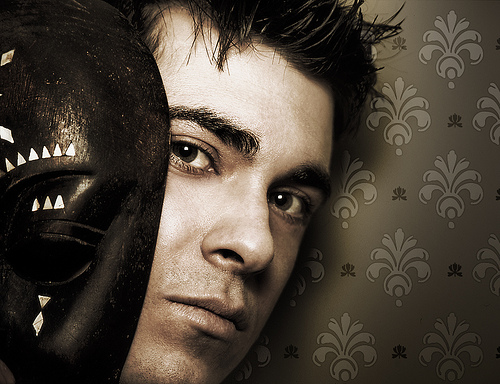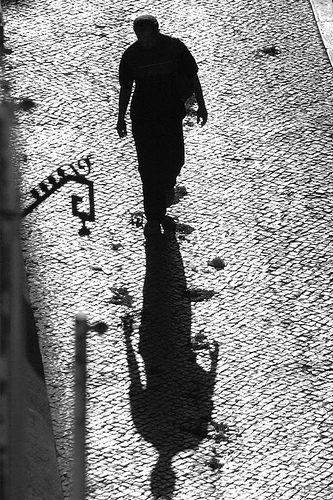
Photo: mike9alive
Ted’s fingers rattled as they felt along the dusty shelf. He stood on a short folding ladder but could not see where his hands reached. He sensed a long, thin metal thing, like curtain rods, cool and hard to his touch. Then it came back to him. Wrapped in the yellowing twin bed sheet was his old shotgun.
He came across it completely unexpected, pushed way back against the wall on the uppermost shelf in the bedroom closet. After nearly a year, Ted was finally clearing out the last of Della’s clothes.
Goodwill, maybe the Salvation Army, or the DAV – whichever had called him – was coming to pick them up Monday morning. Four armloads of her lovely, delicate things, still on their hangers, Ted stacked up on the wrought iron bench on the front porch. Had anyone noticed, his determination would have revealed an enduring devotion to his late wife. He placed each armful down gentle reverence, but no tears. Della’s clothes had waited a long time alone in the dark closet. Ted could not bring himself to discard them. He knew how empty the bedroom would be once they were gone.
Dr. Phil, whose show Ted never missed, had helped him finally decide. As the balding host patted the clenched hands of a distressed, weeping woman whose husband had been killed by a drunk driver, he told her, “I’m here, Gertie, not to tell you what you want to hear, but what you need to hear.” Then the camera closed in on Dr. Phil’s mouth, and he offered his prognosis: “Yes, you can move on, but only if you let go of your past. Your husband would want you to be happy, don’t you think, Girl?” He smiled broadly, certain he had made a difference.
A mustache hid Dr. Phil’s teeth, but even after his lips had stopped moving, his advice echoed in Ted’s head, even an hour later. He pushed his face into the soft fabrics. The scent of her remained. With the last bunch balanced on top of the heap, the little bench was completely covered. The wind swirled up and Della’s wardrobe became a brilliant, billowing pyre of drying leaves in her husband’s welling eyes.
***

Photo: defrostca
The little brass bell tinkled faintly and fell silent above the door of the pawnshop. A burly clerk wearing a dirty wifebeater squinted to check Ted’s height against the dirty yellow line that ran up the side of the doorframe. Five-ten. Old white guy. At least 60. He pulled himself up from a tattered stool and stood behind the garish, gilt cash register. He shoved the stool he had been slouching on back with his foot, and crushed a half-smoked Marlboro into a big glass ashtray full of twisted butts.
Ted shuffled up to the crisscrossing wire screen, carrying the long, draped object as if it were an offering. He laid it carefully on the counter. His eyes stung when the clerk asked what he could do for him. Ted unwrapped the shrouded shotgun. When no reply came, the pawnbroker took a disinterested guess.
“You want to hock that old thing? I can only give you ten bucks for it.” He tried hard to look bored, but studied the gun. It was worth fifty easy. Ted hesitated, his eyes darting to every corner of the dingy room. He stared expectantly, uncertainly into a security camera on the ceiling. Its red light didn’t blink back.
“No. No deal,” he finally said. “I was more wondering how much shotgun shells cost nowadays. I don’t have any, anymore.”
“Depends on how much ammo you buy,” the tattooed man behind the grill replied, suddenly taking a personal interest in his customer. He turned his back on Ted and reached high toward a stack of dusty cardboard boxes. Bullets he knew all about. He even had one in his shoulder he regularly dared various girlfriends to feel with their fingers. It usually led to what he was after. “I can let you have a box of 500 shells for forty bucks,” he said, even before turning back to face Ted, his brown teeth reflecting the shop light that buzzed and flickered on the ceiling.
“Got anything smaller, uh, cheaper?” Ted knew what he couldn’t afford. Disappointed only a moment, the pawnbroker shrugged. “Sure, Pops. A box of fifty is seven bucks. Plus tax, of course. Gotta support the fuckin’ gov’ment!” The gruff word slipped out before he could stop himself. He was used to dealing with a rougher clientèle, a younger generation. More often than not, such language sealed a deal. But Ted didn’t react as he feared. His facial expression remained flat, his eyes fixed on the box, so the relieved clerk held out the bright red package for Ted to inspect.
“Well…you want it?” It was a pathetic, half-assed query. He knew his customer.
Ted’s mottled hands shook as he fingered the box lid. Then, without opening the top, he set it down, quickly, as if it had morphed into a hot potato. It shimmered next to the long gray barrel of the shotgun, lying empty and impotent on the counter. Ted’s mind drifted to a quiet, dark place.
“Not today, I don’t guess,” Ted said, without looking up.
“Suit yourself. You know where I am.” The clerk put the box aside and stared at Ted’s blank face. He was in the habit of double-checking, just in case. As the silent man moved slowly toward the exit, he recalculated. Now Ted looked more like 5’8”. Still just as white. Probably pushing 70. An old man plumb used up. He’d be back.
“Hey, listen, pal,” the clerk shouted to Ted as he pushed open the heavy door. He offered a word of advice. “You be extra careful with that useless old thing on your way home. It won’t do you any damn good without ammo. Hell, a million niggers’d kill you for it in a heartbeat.” He cursed at himself under his breath and bit his lower lip. The little bell jingled in reply.
***

Photo: shinealight
Back home again, Ted found in his mailbox a white glossy envelope from the Office of the Taggart County Court. It was wedged between a flier about real estate opportunities and a glossy pamphlet hawking vinyl replacement windows: This week only! Last, Best Chance! It was the same one he got every week, addressed to Occupant. Ted walked to his letterbox routinely just before noon every day, except Sundays. On weekdays, he brought the junk mail back to the den and plopped down again in his ratty yellow reclining chair. He usually waited to go through the mail during commercials. Let’s Make A Deal was on at noon, The Price Is Right followed at 12:30.
Ted scanned a deal for a free oil change with four new tires, but since his car sat uninsured now in the dusty garage, undriven for nearly a year, he tossed the ad aside. He pondered lawn care service. Della had always done the gardening. Although he never bought anything, reading ads, made Ted feel alive, like he was in his own commercial. The ones on TV were too loud. The networks always turned up the volume, so Ted would push MUTE on the remote, and read his mail in a hopeless ritual of imaginary ordinariness until Monty or Bob Barker came back on.
On Sundays, no mail came, so Ted stayed in bed until he had to get up to use the bathroom. The water he passed was paler than it used to be. It didn’t smell as strong, either, so Ted flushed every other time. A serious looking scientist had given some advice about pinching pennies on Ellen Degeneres’ show he remembered: “If it’s yellow, let it mellow.” Ellen’s studio audience broke up laughing. Some covered their mouths in embarrassment. Ted watched Ellen’s show every weekday morning. It started at 11. Her fans won gifts for just showing up.
What day they attended determined the quality of prize they received. Ted had figured out that the best day was usually Wednesday. One time, Ted watched the studio audience jump up and down like sizzling popcorn when Ellen announced, “You and your partner — ” and here the comedienne lolled her tongue about like a lascivious dog before coming to her climactic bombshell: “– Are going on an all-expenses paid Caribbean cruise!” Ted did not move a muscle, but the audience screamed so loud he had to hit MUTE even before the commercial break.
Walking unsteadily back with the mail on Saturday, Ted felt queasy the moment he noticed a piece of personal mail on official looking stationery. It was a # 10 envelope, brighter somehow than white, paper thin enough to slice any finger that opened it carelessly. It had an embossed Tarrant County seal in the upper left hand corner. Ted’s heart beat like a frightened bird’s wings. He searched his memory, flashing from one unlikely possibility to another like a haywire tuner.
Was this a notice of an overdue tax bill, or maybe a forgotten parking ticket? When his wife was in the hospital, he had forgotten all about that sort of thing. Nowadays, everything unexpected meant another expense. Gasoline had topped four dollars. He learned that from watching television, of course, not from experience. People everywhere were mad about it. Ted remembered when it was only a quarter.
“I pay my taxes,” he exclaimed in frustration, though nobody was within earshot. He simply wished everybody in the entire world would leave him alone. The deep private despair he struggled to endure was completely beyond his control, without explanation, comprehension or justification. His wife’s life insurance had just barely paid off the mortgage, but Social Security was still four years off. Ted kept company with his grief, closed in one room to lower his utility bills. Most of his heat came off the TV, most of his food from a hot plate.
As Ted carried the mail back inside, his slippers snagged cracks in concrete driveway. Each step he took with increasing resentment. He muttered a long unintelligible string of threatening words any TV censor would have to bleep. He settled again in front of the muted set. His recliner, a table lamp with a burnt out 3-way bulb and a twin bed wedged into the corner made the room cramped. Snack bags littered the table, and the erratic TV glow alternately illuminated the dim space and plunged it into darkness. Optical madness somehow calmed Ted down. A makeshift curtain over the window behind the television set kept the glare down. Ted did not care to see out any more than he had to, anyway.
The white envelope was addressed formally, in a type font so feeble it looked gray. Ted turned it over repeatedly in his hand. An eerie semaphore blinked back and forth between the blank and printed side. The screen spat an unpredictable pattern of blue, red and green. For a moment, Monty Hall’s face appeared on the envelope, so Ted looked up. He searched the faces of the audience members: clowns, cowboys and sailors in pairs.
Someday he hoped he would recognize someone he knew in the crowd. Monty’s mouth was moving a mile a minute, but the mute button was still on. The word itself was plastered in green text over the breast of a woman wearing a donkey head. Monty was smiling and his waving fist was full of money. Ted’s brow narrowed and his mouth tightened. Someone lucky was about to get to make a deal.
Without taking his eyes the screen, Ted slid his finger under the glued flap, slicing the skin of his fingertip cleanly apart. No blood spilled, but it sent a sharp pain to his brain. Then the hurt numbed and he examined his injured knuckle. It had separated like a miniature Red Sea. He examined the tiny crevice with detached curiosity. He glanced back up in time to see Monty’s girl reveal from behind Curtain Number Two, his fat emcee, Don Pardo, riding a camel. Ted sucked on his wound, feeling as stupid as the unlucky , contestant. He would have picked Door # 2, too. It usually concealed the best prizes like furniture, 50 square yards of new carpet, a dinette set or a complete bedroom suite. Nobody wanted a camel. What a humiliating joke.
“We’ll be right back after these important announcements,” Ted lip-synced. Now a local attorney offered his ambulance chasing skills to those who had been injured in a car wreck, declaring, “Don’t take matters into your own hands. Let a real expert fight for you!”
Suddenly filled with determination, Ted put the back of his thumb into the gap and tore the envelope open. The single sheet of stationary inside was folded into thirds. Its creases resisted flattening and stayed open like a trough until Ted bent the page back and read the notice. It was a Court Order requiring him to report for Jury Duty.
The letter was brief and business-like. Unless Ted could convince the Court that he deserved a reprieve or delay, he was obligated to appear and to serve. He stared at the words, wondering if his achy knee or recent diagnosis of depression counted as a legitimate excuse. He doubted his physician would support such a claim. In fact, he feared Dr. Sinclair would say, with hopeful enthusiasm, “This is precisely what you need, Mr. Stevenson . A wonderful way to get out of the house and interact with people, again.” Ted decided not to call the doctor’s office. He would just have to show up at the courthouse and take his chances.
He tossed the letter toward the table and stretched out fully in the tattered brown chair. He often preferred the flat out position. The envelope drifted to the floor, coming to a perfectly silent landing. Back o n TV, Monty was offering a hundred dollars to a woman wearing a doggy costume, her nose a brown puffball above broom straw whiskers. With a flurry and a scream, she pulled a corkscrew out of her purse and Monty handed over the cash. Everybody in the audience clapped, smiling and waving to relatives back home. Monty saluted Ted, presumably, even though his eyes were closed. The credits rolled too fast for anyone to really identify a single name.
***

Photo: gustty
At three on Sunday afternoon, Ted awoke. This was not a normal time for him to stir, if any hour or activity was normal anymore. He usually slept until time for dinner, a can of beans or a jar of apple sauce eaten with the same spoon everyday. He did not wash silverware anymore, just rubbed it clean with a paper napkin. “I got all the worst germs already,” he groused aloud to the newsman’s disembodied face when he introduced a story about the destruction caused by AIDS.
Ted threw his weight forward two or three times before sitting upright. The recliner’s old hinges had gotten comfortable where they were. Greeting him now was Judge Judy. Her spunk perked Ted up, so he found the remote down in the cushion where it liked to hide, and turned her up. Judge Judy was always skeptical, never took anyone’s bull, as she sought out the whole Truth, and nothing but.
“Do you mean to tell me, Sir, that his mere words caused you to feel threatened? Is that why you assaulted him? Look at me, Sir, not at him! And answer my questions.” Her black eyes burned with moral indignation. The Defendant shifted from one foot to the other.
“They certainly did, your Honor,” the young blond with a ponytail replied. His shirt was two inches too big at the collar and necktie was an obvious clip on.
“What did he say to you, exactly?”
“He told me to — well, he overheard me talking to my friend and –”
“But what did he say? Tell me, sir, or sit down.”
Shuffling his feet, his eyes cast down in deceit, the young man replied gruffly, “He, like, practically accused me of being…queer. You know, all gay. And that’s why I punched the faggot’s lights out.”
The courtroom audience stifled its embarrassed laughter. So different from Monty’s show, Ted thought. Instead, three sharp tones resounded out of nowhere – Duhn – Duhn – DUHN – as if Judge Judy had an orchestra in the wings. Ted recognized the suspenseful coda, popularized first on Regis’ Who Wants To Be A Millionaire when a befuddled contestant was trying to decide on a final answer. The same three chords were familiar to him from The Weakest Link. They heightened tension while the uptight British woman who ran the show waited to cast the unfortunate into oblivion. Ted appreciated how TV gave people at home a chance to feel all the emotions that the contestants did.
Judge Judy waited, and so did Ted. Her face was grave. Sympathetically, she turned to the Plaintiff, her face narrow like a weasel digging in the ground. Then she turned to address the grinning, longhaired bully again. His greasy locks were tied back and he wore a gold chain around his neck. His open shirt showed a smooth, tanned chest.
“Didn’t you, in fact, sir, call him a ‘sissy’ first?” she demanded. Her fingers formed a parentheses in mid-air. “That was his testimony. You insulted him.” Her eyes flared and she thrust out her chin. Before he could prevaricate, she pinned the defendant down. “Because if that is what you called him, I would suggest you consider his position.” She smiled and smacked her lips. She was about to burn him like toast.
“Whaddayamean? What are you talking about?” The blond stud was confused, and did what came naturally. He ducked the question and shook his head. “No way, man.”
Judge Judy sized the fellow up and made it clear for him. “Well, let’s suppose someone wearing a gold necklace and hair mousse…like you do…came onto me, you know, romantically and all…well, I might misunderstand him, too.” Each phrase dripped with sarcasm.
“Huh? No! You got it backwards.” the young man protested. “I wasn’t coming on to him. It was the other way! He was the one being like all gay to me! I don’t see why – ”
“Quiet! I’ve heard enough.” Judge Judy barked. “Frankly, I’m not sure whose story to believe. But dental bills are not cheap and you are the one responsible for his injuries, even if he did hit on you first.“ She paused only a moment before adding, “Which I seriously doubt.” The plaintiff touched the back of his hand to his mouth.
The camera focused in on her stony, wrinkled face. “You had better be more careful whom you insult, Mister. Judgment on behalf of the Plaintiff in the amount of $1500. Case dismissed.”
Outside the courtroom, the victor praised Judge Judy for her wisdom. His parents, and someone who could have been a girlfriend, stood behind him in support and heavy winter coats. When he smiled, Ted could see he wasn’t even trying to hide his chipped tooth. The camera zoomed right in on it. After he stepped away, the sulking Defendant would not even stop to chat with Doug, the Interviewer. He kept moving, but, just off camera, Ted heard him utter a loser’s assessment of justice: “Man, this is messed up!”
For the first time all day, Ted smiled. He liked it when the right thing happened, fairly and squarely. More to the point, he detested unfairness. It had always been his inclination to act honorably. Many accountants he knew took shortcuts, but Ted did not. He was – had been, at least – an account advisor, earning a good salary. At 60, he was five years from retirement. He put in more hours at work than men half his age, partly due to dedication, but mostly because he thought every client deserved equal attention. It was only fair. Unfortunately, when a younger colleague embezzled $230,000, the crime did not damage him nearly as much as it did Ted.
The subsequent financial shortfall was devastating. The firm’s business dried up when the story hit the local paper. While the culprit spent seven months in jail and paid a fine, his actions cost Ted his career. To his superiors, it was merely a business decision. Eliminating Ted’s position would save stockholders’ money. Without so much as a discussion, they gave him two months severance, a cheesy plaque of recognition, and a going away party. Ted and Della were too stunned to object. Ted was loyal to a fault. Della was ever the optimist.
“It was the right thing to do, staying to the very end of your party,” his wife told him on the last day. Ted knew by her tone and the look on her sweet face that she trying to lift his spirits. In the car, she slipped off her seatbelt and slid over close to him. It brought a comfort they both felt nobody could ever take from them, a swelling of mutual peace.
The company continued to carry Ted’s health insurance for the mandatory eighteen months, supposedly enough time for him to land another job. But since 9/11, nobody was hiring, especially workers his age. Six weeks after their policy coverage lapsed, Della was diagnosed with metastatic HER2-positive breast cancer. His forced retirement, her illness, the cost of surgery, then radiation and chemotherapy — everything came smashing down like a frigid hammer, squandering a lifetime of savings in a futile attempt to overrule fate.
Off she flew to Heaven in twelve desperate, dizzying months. Their adult son, Luke, came from the west coast for the funeral, but only stayed with his father five days. He had a job and a family to support. After he left, watching TV in the den consumed Ted’s hours. Life isolated in the darkened room was familiar, predictable and forgettable, and helped him pretend he was not utterly alone.
***

Photo: extranoise
Monday morning at 7:30, Ted awoke and showered. He ate a cold Pop Tart, wearing the maroon bathrobe Della bought him on their last anniversary together, their thirtieth. He pulled a striped tie over his head and tightened the knot. He had not worn one in nearly a year. For once, he did not turn on the TV. He was afraid if he did, he might forget to go downtown to the Courthouse.
The sky was overcast when he stepped outside. Della’s clothes had settled into a lumpy pile on the porch bench. Low gray clouds ran to the horizon. Ted put his palm up to feel for rain. Nothing, but he went back inside and grabbed an umbrella just in case. He used it like a walking stick as he made his way to the bus stop.
An attractive black woman was sitting in the bus shelter when Ted approached. He forced a smile and mumbled “Morning.” She nodded an acknowledgment. About seventy, she was neatly dressed in a tweed suit and broad rimmed blue hat. They glanced curiously sideways at one another, but did not speak further, and, in a minute, the bus came along. Along one side was an advertisement, a twenty-foot long, four-color image of Vanna White in a stunning gown. Bold block lettering reminded everyone drawn to her flowing hair, long legs and friendly grin that she could be seen turning over letters at 5:30 and 7:00 each weeknight.
Ted never watched Wheel of Fortune. His wife, on the other hand, never used to miss an episode. Della often told her husband that she thought “Pat Sajak is almost as handsome as you, darling, when we married.” Ted stepped aside to let the black woman board first. As she passed, Ted immediately recognized the scent of Della’s perfume. It made him forget about Vanna. Then he climbed the steps and reached into his trousers for coins, realizing too late that he did not have any change.
“How much?’ he asked the driver, stalling, still searching his empty pockets.
The bus driver looked at him dully. He heard this question all day long, especially from his older riders. He tapped a faded sign three times with his finger. The print was impossible for Ted to read, so he turned around to get off the bus again. But the black woman rose from her seat near the front and slid a dollar into the pay slot.
“We only have to pay a dollar,” she said warmly. “I got you covered, Darlin’.”
Ted blushed, but composed himself enough to express his gratitude. He had almost completely forgotten about the existence of pure kindness. The driver just shook his head. The automatic door shut with a whoosh, and the bus lurched forward. As he swayed toward a seat, Ted’s brain unexpectedly found his sea legs, unused since his duty in the Pacific, and he navigated to a spot near the middle of the coach. On the pleather seat back in front of him, he saw a scrawl of graffiti:
DuM-AssS
He imagined what Judge Judy would say about that — and relished what punishment she would dole out. As they rocked along, he saw in his mind’s eye the all-knowing judge make the perpetrator show his stained hands to the court. Ted knew exactly what she would say. “You have every right in the world to be an artist…” and then her eyes would narrow and burn into his. “…but not on MY canvas, young man!”
As the bus neared the center of Fort Worth, it stopped directly across the street from the office building where Ted used to work. He could not keep his eyes from rising to the sixth floor window. That last day, he had stared into a burning sunset, fists hardening like hissing lava as the sun rolled on to light someone else’s future, leaving him behind, forgotten.
Suddenly, a man sprang from the building’s revolving door, an attaché case swinging behind him like a pendulum. His dark suit glistened like stars on a moonless night. Ted’s mind made an instant calculation: this fellow could be his replacement. Then he felt a nauseous panic, as the young man ran toward the bus, looking straight at Ted, his mouth moving in muted desperation. Ted heard the closing bus door and felt it pick up speed, but he could also read the running man’s lips. “Hold! Wait ! –”
But, his attempt was hopeless; it was too late. The driver did not notice the man or his raised briefcase. The bus was rolling again, its air brakes snapping twice like an angry bullwhip. Ted stared back through the window until the well-dressed young man, his valise now hanging limp at his side, slipped out of view. Ted wiped his cold forehead dry, a half smile curling across his lips. Then contentment yielded to misery, and Ted’s head suddenly ached intensely. Closing his eyes, he drew long, slow breaths against the fire in his chest. Waiting the sensation out, Ted stared at his shoes until his long latent rage melted into shame. It always did, if he waited long enough.
They rode on a few more blocks, then Ted heard a bright ding, and the bus came to squealing halt. The woman he got on with was up and headed toward the exit when Ted realized it was his stop as well. He followed, losing sight of all but her hat, until he caught up at the foot of the broad concrete steps of the Courthouse. He kept his distance, and she did not look back, so he needn’t have bothered.
He was watching, witnessing himself moving in a busy world he had withdrawn from nearly completely. Everything before his eyes – people, traffic, and reality – seemed like an old-fashioned, live broadcast, and he had a bit part to play. A cameo awaited.











2 comments so far ↓
Nobody has commented yet. Be the first!
Comment